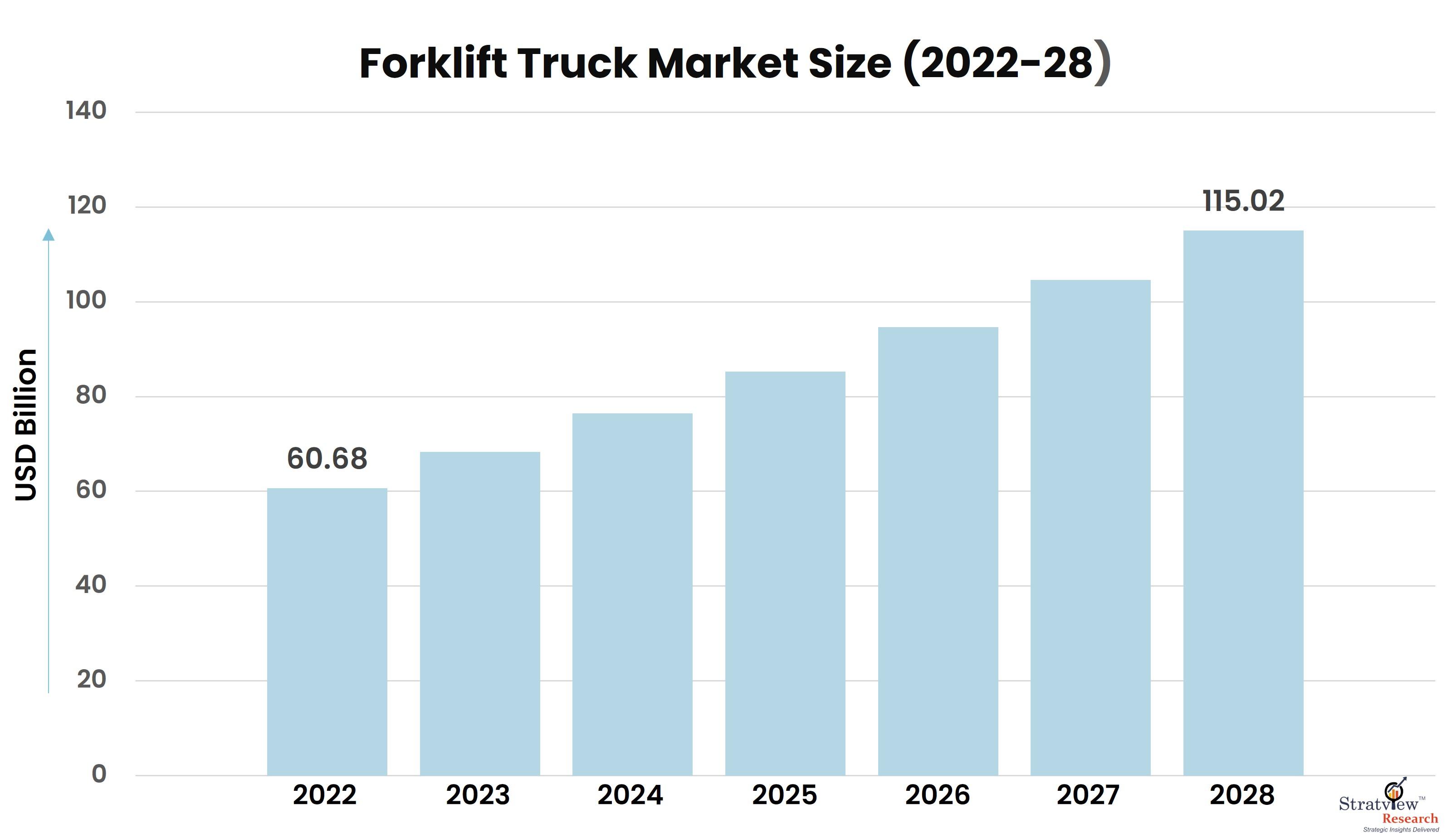The forklift truck market is on the brink of significant growth, driven by a confluence of factors that are reshaping the landscape of logistics, warehousing, and industrial operations. From technological advancements to evolving consumer demands, the potential for expansion in this sector is substantial. This article explores the key drivers, emerging trends, and future opportunities that are fueling the growth of the forklift truck market.
According to Stratview Research, the forklift truck market was estimated at USD 60.68 billion in 2022 and is likely to grow at a CAGR of 10.99% during 2023-2028 to reach USD 115.02 billion in 2028.
Key Growth Drivers
Booming E-commerce Sector: The rapid expansion of the e-commerce industry has necessitated more efficient and scalable logistics solutions. Warehouses and distribution centers are expanding and optimizing their operations to handle increased volumes of goods. Forklift trucks are essential in these environments for quick and efficient material handling, making them a critical component of the supply chain infrastructure.
Industrial Automation: The push towards automation in various industries is a significant growth driver for the forklift truck market. Automated guided vehicles (AGVs) and autonomous forklifts are gaining traction as they enhance productivity, reduce labor costs, and minimize errors. These advancements are particularly appealing in high-volume environments where speed and accuracy are paramount.
Urbanization and Infrastructure Development: Rapid urbanization and the ongoing development of infrastructure in emerging economies are contributing to increased demand for forklift trucks. Construction sites, manufacturing plants, and expanding industrial zones require reliable material handling equipment to support their operations, driving the growth of the forklift truck market.
Sustainability Initiatives: The growing emphasis on sustainability and environmental responsibility is influencing the forklift truck market. Electric and hybrid forklifts are becoming more popular due to their lower emissions, reduced noise levels, and lower operational costs compared to traditional internal combustion engine (ICE) models. This shift towards greener solutions is expected to drive market growth as companies seek to reduce their carbon footprint.
Emerging Trends
Technological Innovation: The integration of advanced technologies such as artificial intelligence (AI), machine learning, and the Internet of Things (IoT) is transforming the forklift truck industry. AI-powered forklifts can optimize routes, manage loads more efficiently, and provide real-time data for predictive maintenance. IoT-enabled forklifts offer enhanced connectivity, allowing for better fleet management and operational efficiency.
Smart Warehousing: The concept of smart warehousing is gaining momentum, with forklifts playing a pivotal role in this transformation. Smart warehouses leverage connected devices, automated systems, and data analytics to streamline operations. Forklift trucks equipped with sensors and telematics can communicate with other systems within the warehouse, facilitating seamless integration and improving overall efficiency.
Enhanced Safety Features: Safety is a paramount concern in material handling, and modern forklift trucks are being equipped with advanced safety features. Technologies such as collision detection systems, automatic braking, 360-degree cameras, and ergonomic designs are enhancing operator safety and reducing the risk of accidents. These innovations are driving the adoption of newer forklift models in various industries.
Future Opportunities
Expansion in Emerging Markets: Emerging economies in Asia-Pacific, Latin America, and Africa present significant growth opportunities for the forklift truck market. Increasing industrialization, urban development, and investment in infrastructure are driving demand for material handling equipment in these regions. Companies that can offer cost-effective and reliable forklift solutions are well-positioned to capitalize on this growth.
Customization and Specialization: The need for specialized forklift trucks tailored to specific industries or applications is growing. From narrow aisle forklifts for dense warehousing to rough terrain forklifts for construction sites, customization is becoming a key trend. Manufacturers that can provide tailored solutions to meet unique operational requirements will gain a competitive edge.
Aftermarket Services and Support: The aftermarket segment, including maintenance, repair, and parts replacement, offers substantial growth potential. As the installed base of forklifts expands, the demand for reliable aftermarket services will increase. Companies that can provide comprehensive support and maintenance services will build long-term relationships with customers and enhance their market presence.
Conclusion
The forklift truck market is poised for robust growth, driven by the expanding e-commerce sector, increasing industrial automation, and rising urbanization. Technological advancements and the shift towards sustainable solutions are further propelling the market forward. As companies continue to innovate and adapt to emerging trends, the growth potential of the forklift truck market remains strong. By leveraging these opportunities, businesses can enhance their operational efficiency, meet evolving customer demands, and drive future success in the dynamic material handling landscape.

